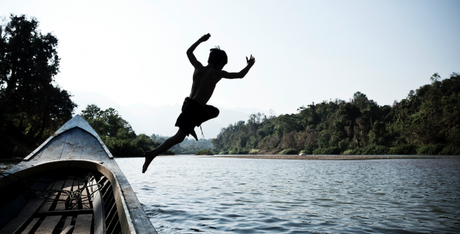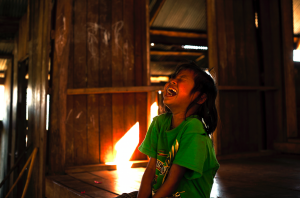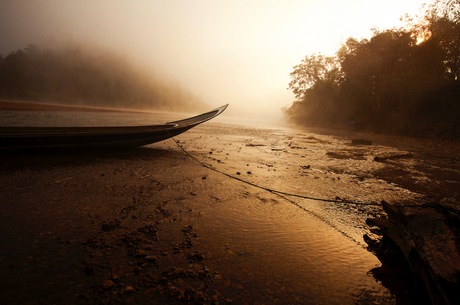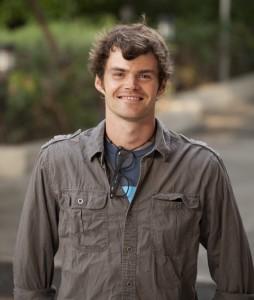
Dodging Landmines in Eastern Burma
For three weeks I had been traveling north on Highway 105 working on a photography book documenting the lives of individuals who had come to live on the Thai-Burma border. I had visited refugee camps, tapioca plantations, rubber farms, orphanages, military outposts and villages listening to people's stories of how they had left their homes and come to this area of the world. After staying in Mae La Refugee Camp for a week, my friend and translator Sawkhalawtoo asked me if I wanted to cross over into Myanmar (Burma) and spend some time with a friend of his. Despite the fact that the area was littered with landmines and scarred by brutal acts of war from decades of violence, I was thrilled at the prospect of heading into an area of the country I had yet to visit, and was restricted from entering.
"I was there to document stories of survival in a war-torn land but for some reason I felt like I was living in a place which had never seen the likes of any conflict."
We rose early in the morning and made our way down to the banks of the Moei River to await Saw's friend Naw Bee Po, who would take us thirty minutes upstream to her village on the Burmese side of the border. After a brief encounter with a Thai border guard who didn't think it the least bit suspicious that I was boarding a boat to enter one of Burma's many "black zones," we were off. Naw Bee Po's son Ku Dii was driving the boat while his mother explained the current situation to Sawkhalawtoo. Ku Dii seemed more than thrilled to have me on the boat and couldn't wipe the smile of his face for the entire ride, neither could I.

Mugay Paw's village was a different world compared to the refugee camp I had just come from where space was a luxury and having land to raise livestock or grow vegetables was simply not an option. Upon reaching the top of the hill where the family of six lived, I noticed gardens, pigs, goats, and only one other home in sight. As soon as I arrived and introductions were made, I was asked to join the boys for some spear fishing. With that we stripped down to our skivvies and were back in the water skimming the surface with one-eyed goggles which I hadn't seen since Sean Connery wore them in James Bond.
Upon returning from a rather unsuccessful fishing trip which basically consisted of laying face down in the shallow waters and shooting my rubber band-rigged spear gun at anything that moved, the boys grabbed their father's handmade rifle and took me into the hills to hunt for crows. Prior to our departure from the house I was warned that the area was still littered with landmines and I should be careful not to wander too far off the trail, advice I would most certainly heed. With my camera and bare feet I jogged behind the boys as they excitedly ran down the trail to scout for birds in the distance. Even though we returned empty handed, Naw Bee Po and her husband Maw Toe Ae welcomed us home by serving potato curry with sides of steamed rice, fish paste, and pieces of dried fish. I was there to document stories of survival in a war-torn land but for some reason I felt like I was living in a place which had never seen the likes of any conflict.
After breakfast the next morning I was taken 2 miles deeper into Karen State to see the school where the children in the area would attend, when a teacher was available, to learn a handful of subjects. The students spanned from toddlers to 12 years of age. I spent the afternoon playing games with the kids and trying to teach them a few English songs, which I knew very few of that were simple enough for basic speakers to learn in a short amount of time. So after my ideas ran dry I thought I would go big and teach them a famous theatre song entitled "Dayman" from the comedy series "It's Always Sunny in Philadelphia." Needless to say it didn't go exactly as I had planned and most of the kids couldn't quite get past the second or third line, but they were happy to have learned a few new words in English.

That evening several of the villagers made their way over to Naw Bee Po's home and gathered around her television to watch their favorite Thai drama. We sat laughing and sharing stories about one another, I couldn't help but wonder how similar these people were to other villagers I had met throughout Southeast Asia. They had similar occupations, homes, personalities, and lifestyles. The only difference was that this group of people had spent most of their lives running through the jungle, living in refugee camps, dodging landmines, and seeing friends and family disappear. Yet somehow they had managed to keep their sense of humor, dignity and most importantly their respect for the ones who had caused this madness in their lives. Not once did I hear them curse the Burmese Military or wish harm upon them. After all that they'd been through I can't imagine it was easy to keep such an open heart, but they did.
The next few days were spent visiting different homes throughout the valley to interview the residents about the events that led them to this particular area of the country. Some had lost limbs from landmines, had their homes burned to the ground or had been forced to carry weapons through the mountains. One family even swore that their 6-year-old daughter was a reincarnation of a man who had been shot in the head by the Burmese Military. No matter how much they had been through or how many people they'd lost in their lives, everyone I spoke to always smiled when I left and gave me a gentle handshake while thanking me for coming to listen to them.
Leaving the village was not easy and they insisted that I stay longer but I had to continue on my journey up the border. Naw Bee Po and a few of the villagers accompanied me to the bus station where I gave awkward goodbye hugs (they generally never hug in Karen culture) to everyone and continued waving as the bus pulled off down the dusty street. I felt like I had just left a family I never knew existed and began to feel very empty inside. But as I continued down the road crammed together with many others in the back of an old truck, my feelings suddenly changed. I felt a rejuvenated sense of pride in the human race and realized that the one way to never forget these people was to mirror their behavior by never seeking revenge for those that wrong me or holding hate in my heart. I don't know if I will ever be able to accomplish this as successfully as they have but I suppose if you want to see change in the world you must first see it in yourself.

.
